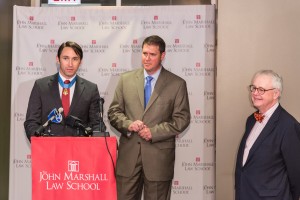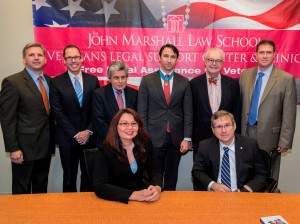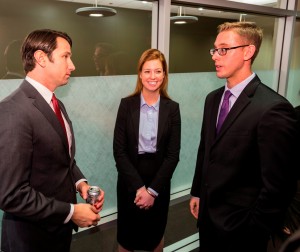“Thank you.”
At a time when members of the military receive thanks from the public for their service, it was Medal of Honor recipient former Army Capt. William Swenson who delivered his own gratitude. Swenson thanked students and staff at The John Marshall Law School’s Veterans Legal Support Center & Clinic (VLSC) for the service they provide to former and retired members of the military.

Medal of Honor recipient William Swenson addresses students and guests at The John Marshall Law School Veterans Legal Support Center & Clinic. He was introduced by Thomas White Jr. (center), director of the Clinic. Dean John E. Corkery looks on.
Swenson has been touring the country since receiving the Medal of Honor in an Oct. 15, 2013, ceremony at the White House. Swenson was recognized for valor on the battlefield in Afghanistan in 2009 after his men came under enemy fire. He was the first Army officer to receive the Medal of Honor since the Vietnam War. He also received the Purple Heart and Bronze Star.
Joining Swenson at John Marshall were U.S. Rep. Tammy Duckworth (D-Ill.), a wounded Iraqi Army veteran and former director of the Illinois Department of Veterans Affairs, and U.S. Sen. Mark Kirk (R-Ill.), a retired Navy veteran.
“It was truly an honor to meet Medal of Honor recipient Capt. Swenson. He was remarkably humble and is using the media attention to raise awareness for the many needs of servicemembers and veterans returning home,” VLSC student Laura Wiley said.

U.S. Rep. Tammy Duckworth (D-Ill.) (seated, left) and U.S. Sen. Mark Kirk (R-Ill.) (seated, right) had a brief informational meeting with (standing, from left) Brian Clauss, executive director, Veterans Legal Support Center & Clinic; Anthony Niedwiecki, associate dean, Skills, Experiential Learning and Assessment; Ralph Ruebner, associate dean, Academic Affairs; Medal of Honor recipient former Army Capt. William Swenson; Dean John E. Corkery, and Thomas White, Jr., director VLSC clinic, about the need for increased funding for veterans services.
“I’m currently representing a system—well, all of us, actually, because the military represents all of us—and the responsibility that comes with this medal is to tell a story, to talk about my team and talk about our fighting force which speaks to us as a nation,” he told more than 100 students and guests who gathered at the VLSC on Oct. 25.
Swenson acknowledged that leaving the rigors of the military can be difficult, and working with the Department of Veterans Affairs (VA) can be daunting for many.
“I know personally, from my own battles with the VA, my own battles with moving from the military to the civilian world, that sometimes you need help and not everyone’s in a good position for that,” he noted. “But that’s where you guys come in, and thank you for picking up where I left off. You’ve been looking after my team—because the military’s my team—and you are now in a better position to help them than I am. So thank you.”
VLSC students and a network of more than 350 volunteer attorneys assist veterans with their claims after the VA has denied their applications for benefits. The VLSC has assisted more than 900 veterans since accepting its first client in 2007.
Swenson said veterans know the military has “a contractual obligation” to provide for them.
“It’s written down on paper, you sign your name next to it and you understand that you have benefits and entitlements, but it’s not part of the social contract. That’s where you step in because every bureaucracy has problems,” he reminded VLSC students.
The legal aspects of all the benefits “truly is part of the missing piece because that’s how the world works…We are a nation of laws. So (for help in) navigating those laws, again, thank you,” Swenson said.

VLSC students Laura Wiley (center) and Nick Esterman (right) were honored to meet Medal of Honor recipient William Swenson (left) before he spoke to students and guests on Oct. 25.
“As veterans, there’s a lot of complexities in the civilian world that we are simply not good at adapting to in rapid order. And that’s where that special contract comes in and where you come in, and that’s where you get to help veterans readjust and re-acclimate and re-engage,” Swenson said.
He said all soldiers have difficulty moving from the military to civilian life, but it is especially difficult for those who join the military when they are 17 or 18.
“They were just beginning to develop their lives and become adults and they did that in a system that is very regimented, doesn’t give you a lot of latitude to make mistakes. And when you do make mistakes, they’re quickly corrected.
“When these guys decide they have done their service and they’ve done so honorably and they need to transition on to a new world, they have difficulty basically changing their language, their vocabulary—literally and figuratively,” he added. “They don’t know how to come out of the military every single time with the necessary cultural shift, the necessary vocabulary to speak to civilian employers or to speak to a legal system which is unique to them…again, that’s a role that you’re filling.”
